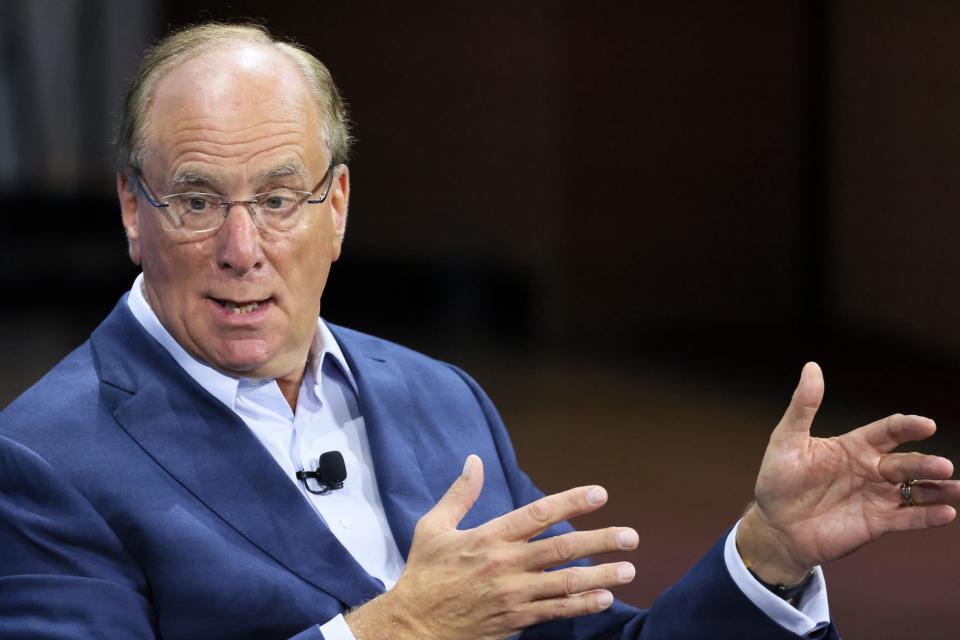BlackRock CEO said 'retirement crisis' needs to be addressed for younger generations losing hope

From his spot at the helm of the world's largest money manager, BlackRock CEO Larry Fink says it is time to "rethink" retirement.
In the 2024 Annual Chairman Letter to Investors released Tuesday, Fink said the "retirement crisis" is getting serious enough to evoke a national relief effort commensurate with that which addressed the 2008 mortgage crisis.
"America needs an organized, high-level effort to ensure that future generations can live out their final years with dignity," Fink wrote.
He said helping workers invest in personal retirement could be a key to the solution. But he also called for opening the conversation on a classically hot button issue: retirement age.
What to know about 2024 Social Security Retirees set to earn up to $4,873 starting January
Longer life expectancy puts strain on Social Security
Social Security is “the most successful anti-poverty program in our country’s history,” according to the SSA. President Franklin D. Roosevelt signed the Social Security Act into law in 1935 as a retirement program for workers. It was part of the historic New Deal, and the first lump-sum payments were made in 1937.
Payments for workers’ survivors were added by Congress in 1939 and regular monthly checks started in 1940. Disability benefits were added in 1956.
Retirees can start collecting their payments between ages 62-70., according to the SSA. Medicare benefits kick in at age 65.
It works in a "pay as you go" system, where today's workers fork over a portion of their income and beneficiaries get monthly disbursements.
But Fink says the creation of the Social Security system was based on shorter life expectancies, when the majority of people who contributed fund didn't live long enough enough to be paid in retirement. A recent report from the Social Security Old-Age and Survivors Insurance Trust Fund estimated that it would not be able to pay full benefits after 2033 without further change.
Fink says people live longer with less financial support
Fink said ongoing medical innovations not only enable more people to live to retirement, but that they will be retired for longer.
"As a society, we focus a tremendous amount of energy on helping people live longer lives. But not even a fraction of that effort is spent helping people afford those extra years" Fink said, adding that the message to workers about their retirement seems to be: "You’re on your own.”
Only a 58% of Americans aged 56-64 reported having a personal retirement account in 2020, according to the U.S. Census Bureau, and that is the highest percentage among the working generations.
Fink named affordability, lack of access to employer plans and barriers to enrolling in employer plans as some of the reasons that prevent people from investing in retirement accounts.
But he believes investing in capital markets and rethinking the years of our lives after 65 will be crucial for the addressing retirement crisis.
Fink wants to make retirement investing automatic, rethink years after 65
Fink said companies need to make an concerted effort to make investing in retirement the default option for employees. A federal law going into effect next year requiring just that is a bright spot, he said.
He also said it should be more intuitive to move 401(k) accounts between jobs, and applauded states that have retirement systems for all workers, even if they're in the gig economy.
Given longer life expectancies, he also suggested opening the conversation about the retirement age, citing countries like the Netherlands that gradually raised the retirement age. He acknowledged the political difficulty of that move, but said that there may be options to reward people who want to continue working into their 70s.
Fink said this is not just a policy and economics problem, but fundamental to giving younger generations hope for the future.
"Young people have lost trust in older generations," Fink stated in the letter. "The burden is on us to get it back. And maybe investing for their long-term goals, including retirement, isn’t such a bad place to begin."
This article originally appeared on USA TODAY: Larry Fink, BlackRock CEO, raises alarm on Social Security crisis
